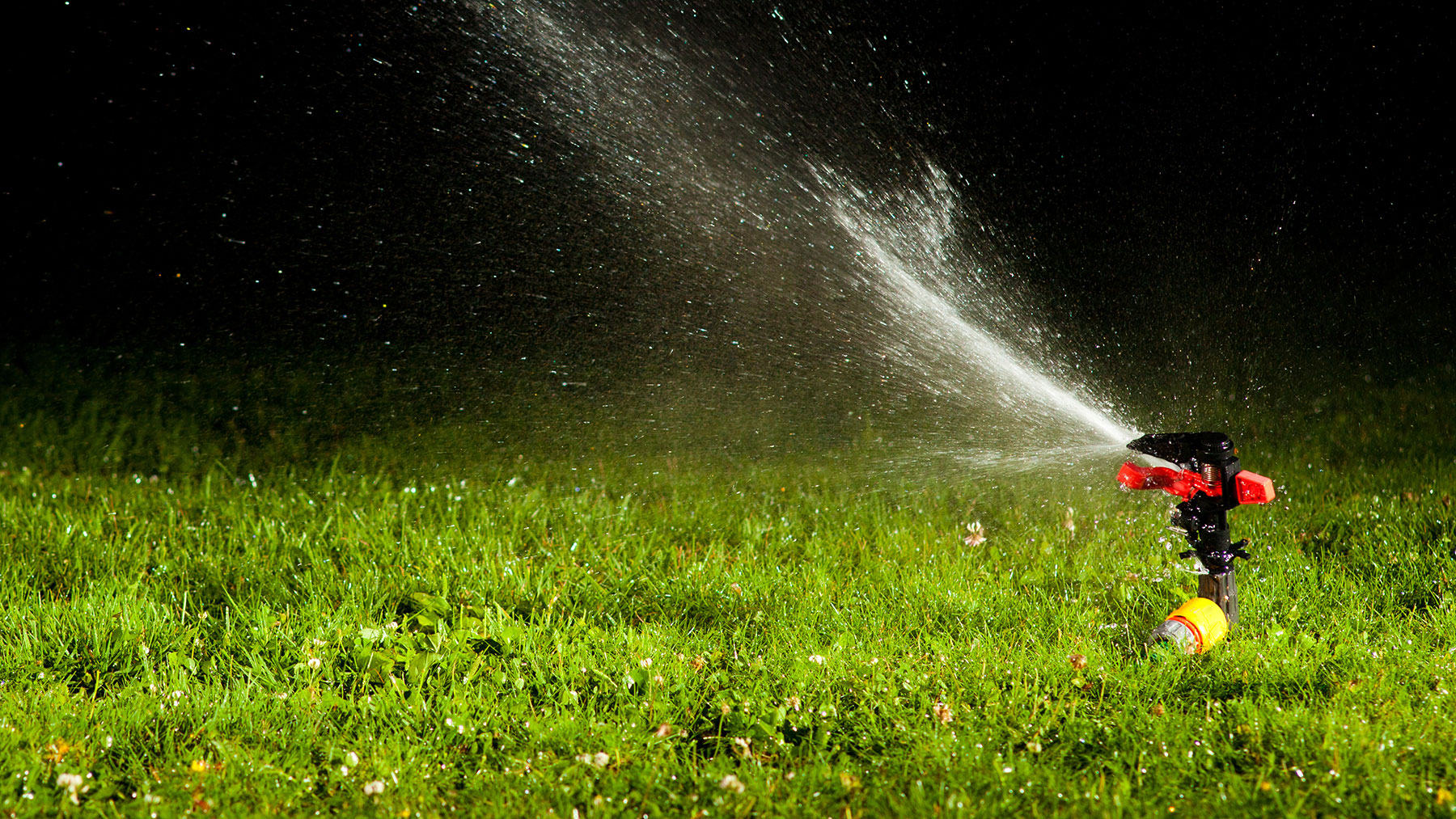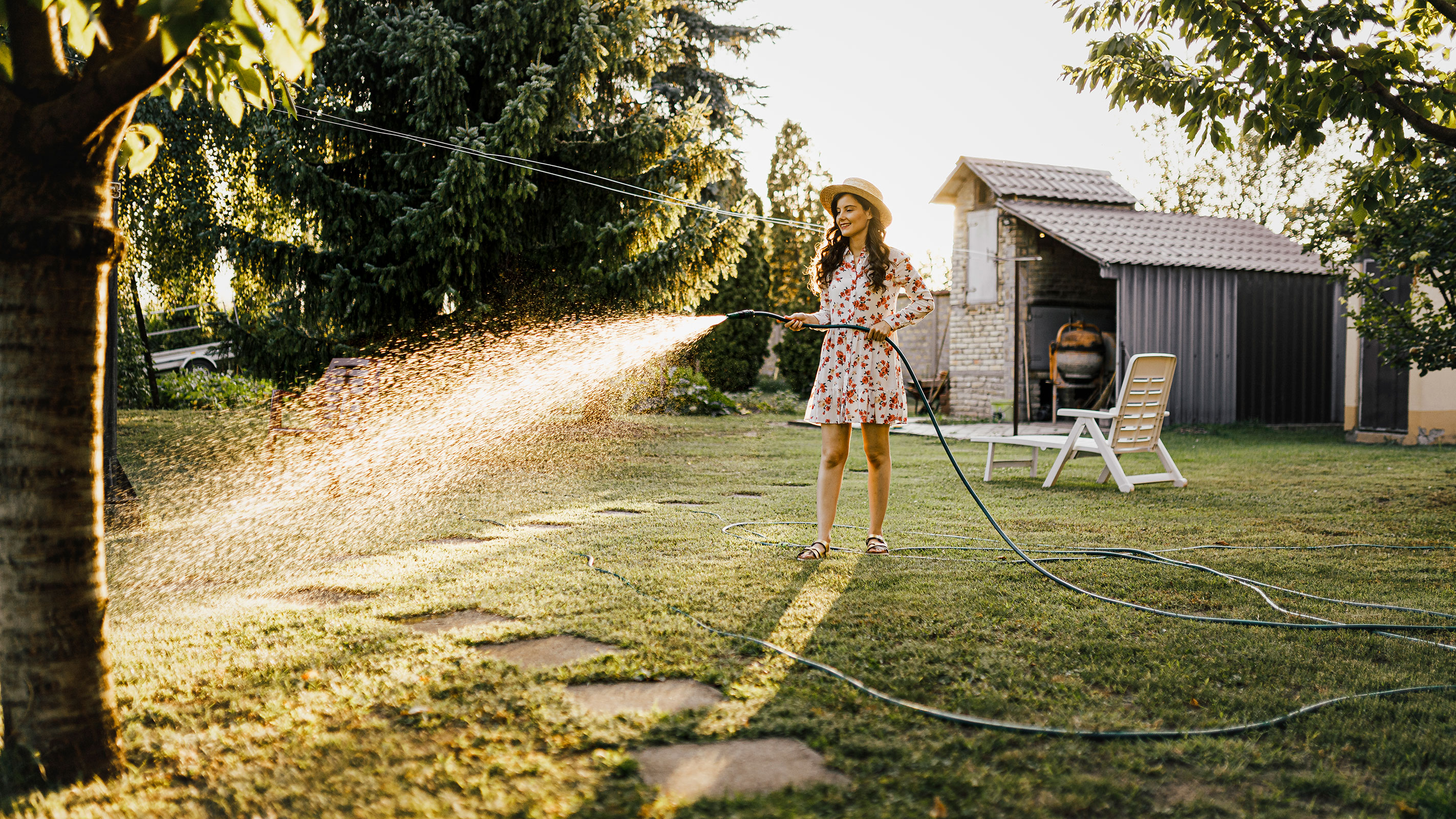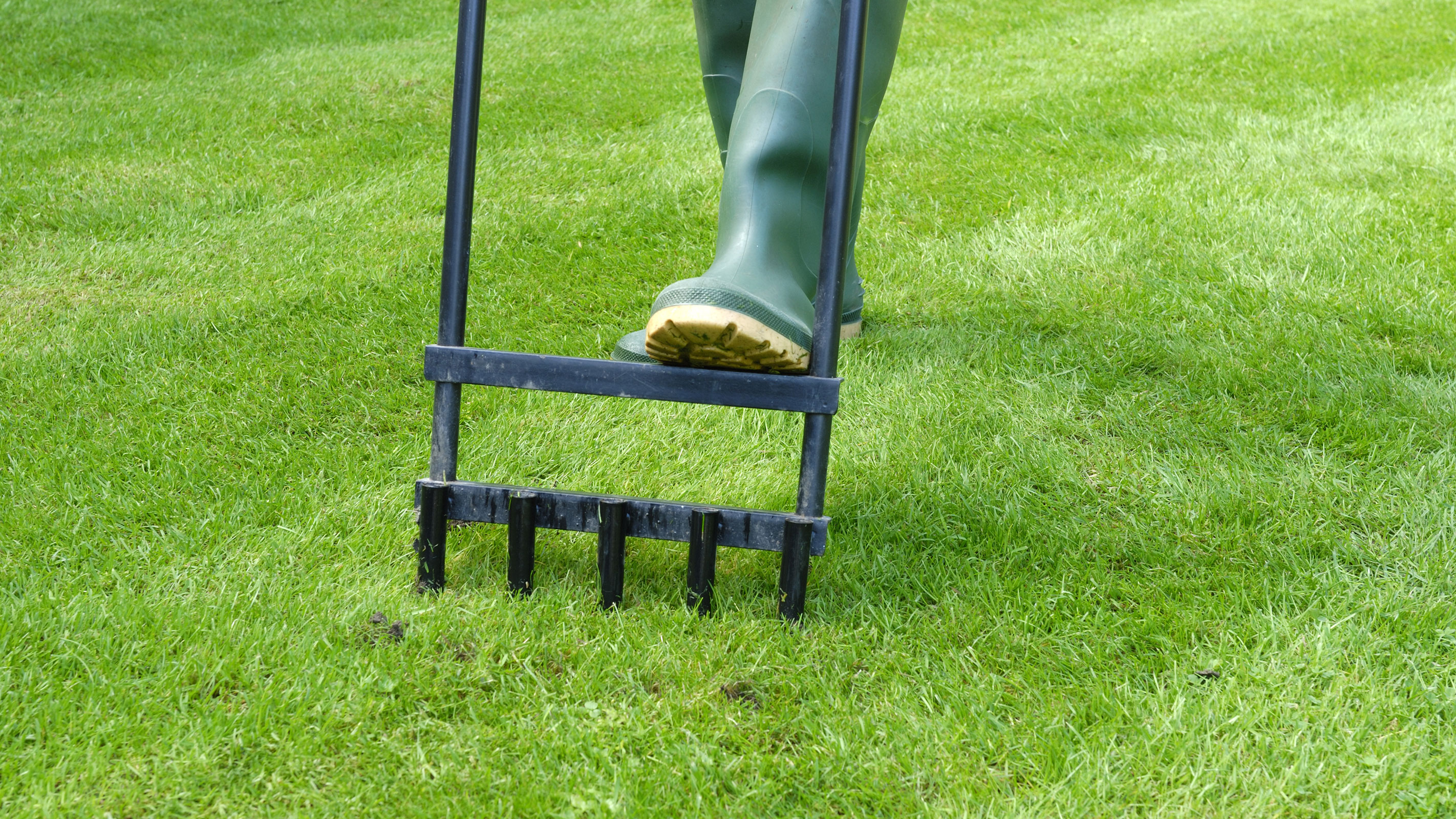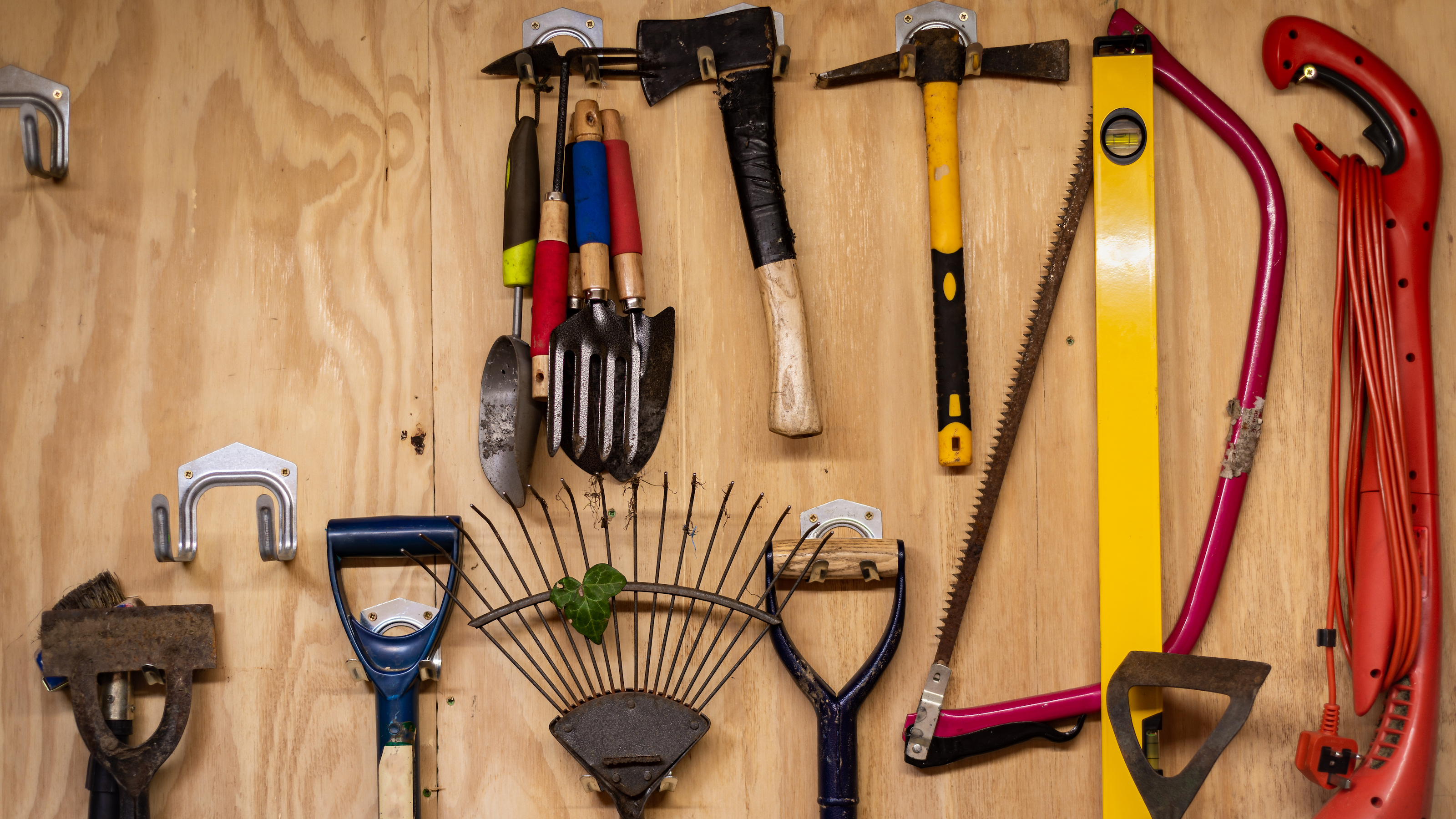Is watering the lawn at night a bad idea? An expert view
Planning on watering the lawn at night? Stop right there. We asked the experts when the best time to water your lawn is and when to back away from the hosepipe

While watering the lawn at night might make sense for many reasons, it is not always the best way to ensure your lawn ideas remain looking in tip top condition.
We all dream of a lush, vibrant green lawn, but in spells of dryness or extreme heat, yellowing grass can become a real eyesore. Understanding when the best time of day to water a lawn is will really help when it comes to ensuring your garden remains looking healthy and fresh when the sun shines — exactly the time when you want to be outside enjoying it the most.
We spoke to some of the top lawn experts around to get their advice on when to water your lawn and when to let nature take care of things.
Will watering the lawn at night damage the grass?
It seems that the belief that watering grass at night will ruin the lawn is, in fact, a bit of a myth — so those worried about their well-planned garden landscaping ideas being ruined due to their nocturnal watering can breathe a sigh of relief.
Many people are well aware that watering their garden while the sun blazes down can cause damage to their plants meaning they tend to wait until the sun begins to set to give the garden a drink — but is this always the best way forward, or are there are other, better, options?
"Watering at night is something often written about and it has been said that it can cause or lead to disease, however that comes from the golf industry where grass is mown to but a few millimetres," says David Hedges Gower, chairman of the Lawn Association. "Advice can be good and bad and what is good for a golf course, may not be necessarily good for your lawn."
"The best time to water your lawn really depends on the weather conditions at the time,," says Angharad James, product manager at Phostrogen. "It is widely thought that watering at night is not advisable as it can result in mildew and fungus growth, which is true in some conditions, however that isn’t the case in extremely hot weather."
When is the best time of day to water grass?
So, if all this talk of avoiding watering at night is mere myth, just when is the best time to water the lawn? According to the experts, there is no one answer to this as it very much depends on your grass and the time of year.
"The truth is that watering, as contentious as this may be, is not generic and should, like most things, be decided by the individual — because what works for one lawn will not always work for the next," says David Hedges Gower. "Different location, different lawn, different species and most of all a different idea on what they want from their lawn."
"If we are experiencing a particularly warm and dry spell, as we have done in recent weeks, then watering in the evening tends to be more effective than during the day," advises Angharad James. "This is because the water will have more chance to soak into the soil and be absorbed by the grass roots. It also means there is less water wastage, as the sun won’t evaporate surface water. As it is still warm in the evenings, the lawn won’t stay wet overnight, which is when diseases can set in."
"Grass, when it's watered, only grows during the cooler evening climate as the plant often shuts down during the heat," explains David Hedges Gower. "The stomata closes and nothing happens (a clever adaption technique our native grasses have.) So, watering during the heat is something that should be reserved for newly laid turf only."
But daytime watering does not always have to be shunned — providing it isn't done in the scorching heat. If you are an early bird, then heading out with the dawn chorus to give your lawn a shower can also work well.
"To encourage strong, vigorous growth, Cobra recommends watering lawns early in the morning when heat is at a minimum to reduce the amount of evaporation," say the experts at Cobra, a leading name in garden machinery. "This allows water to penetrate deeper into the root."
"In cooler weather, it’s better to water your lawn in the morning, as this will significantly reduce the risk of things like mildew and fungus setting in," explains Angharad. "Just make sure you water it fairly early – before 10am – before the sun warms up, as this can result in inefficient watering thanks to evaporation.”

Should I water my lawn every day in summer?
Timings aside, frequency of watering your lawn also needs to be considered.
"How much and when to water are the two questions most people concern themselves with and the rules learnt by many can be misleading," says David Hedges Gower. "Some will say once a week and water deep — but what exactly is deep? Roots will only go so far down.
"If watering, it is best to get into a routine and decide to do it more than weekly," continues David. "Your allotted day may be missed and then you will always be playing catch up. Try to get into a habit of every day, every other day — or not at all of course. Try and use sprinklers that give a good coverage."
Of course this may well leave you asking, 'how much water does a garden sprinkler use per hour?' Be sure to calculate this before going over the top with the sprinkler as the answer may just well be much higher than you expect.
Cobra's experts offer slightly different advice.
"An infrequent yet heavy dose of water is recommended as it’s one of the most effective ways of stimulating stronger grass growth," they say. "So give it a good dose every 10 days or so."
"Most of all, remember generic advice is usually poor advice," concludes David Hedges Gower. "Most water below 4” in depth will be completely wasted. Decide if you need to water at all — native grasses will come back after a dry period anyway."
Tips for looking after lawns in the summer
In addition to watering, what other advice do the experts have for looking after your lawn in the dryer, warmer months?
"Firstly, decide to enhance your soil's water storing space, as compacted lawns will not make use of the water you are applying," suggests David Hedges Gower. "Most will run off and not be of any use at all."
You can help with this by aerating your lawn. Aeration involves poking small, deep holes into the ground. This results in better air circulation and improves the root’s water and nutrient consumption. The best times to aerate a lawn in the UK are during the spring and autumn.
"Water is precious and best use has to be made of what we apply and you should start with low water times and build yourself up to the level you are happy with," advises David. "Make use of you soil’s water storing capabilities and don’t be fooled into thinking that green and stripy means healthy.
"And, of course, before going any further, any hosepipe bans to help with our low reservoirs must be adhered to. It’s essential to stipulate that with the possibility of these bans becoming a more common theme, the use of native grasses is becoming more important than ever."
"Water butts are a great way to collect and reuse any rainwater, so that it can be saved to keep lawns hydrated and gardens watered," say Cobra's experts. "Water butts are also handy to have in case the watering hose ban comes into force over the summer."

Get the Homebuilding & Renovating Newsletter
Bring your dream home to life with expert advice, how to guides and design inspiration. Sign up for our newsletter and get two free tickets to a Homebuilding & Renovating Show near you.
Natasha was Homebuilding & Renovating’s Associate Content Editor and was a member of the Homebuilding team for over two decades. In her role on Homebuilding & Renovating she imparted her knowledge on a wide range of renovation topics, from window condensation to renovating bathrooms, to removing walls and adding an extension. She continues to write for Homebuilding on these topics, and more. An experienced journalist and renovation expert, she also writes for a number of other homes titles, including Homes & Gardens and Ideal Homes. Over the years Natasha has renovated and carried out a side extension to a Victorian terrace. She is currently living in the rural Edwardian cottage she renovated and extended on a largely DIY basis, living on site for the duration of the project.

